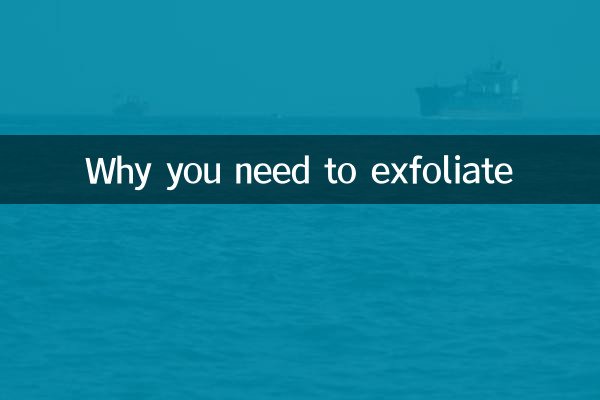Why you need to exfoliate
Exfoliation is one of the most important steps in skin care, but many people don’t know exactly what it does. This article will combine the hot topics and hot content on the Internet in the past 10 days to deeply explore the necessity of exfoliation and provide structured data to help you better understand this skin care step.
1. The functions and problems of the stratum corneum

The stratum corneum is the outermost layer of the skin and is primarily composed of dead keratinocytes. Its main function is to protect the skin from damage from the external environment, such as UV rays, bacteria and pollutants. However, an excessively thick stratum corneum can lead to the following problems:
| question | Performance |
|---|---|
| Dull skin | Excessive thickness of the stratum corneum blocks light reflection and makes the skin look dull. |
| clogged pores | The accumulation of old dead skin cells can clog pores and cause acne and blackheads. |
| Poor absorption of skin care products | Thick stratum corneum will hinder the penetration of skin care products and reduce their effectiveness |
2. Benefits of exfoliation
Regular exfoliation can solve the above problems and provide the following skin benefits:
| benefit | illustrate |
|---|---|
| Brighten skin tone | After removing dead skin cells, your skin will appear brighter and more lustrous. |
| Promote skin care product absorption | After exfoliation, the active ingredients of skin care products can more easily penetrate into the deeper layers of the skin. |
| Prevent acne and blackheads | Reduce clogged pores and reduce the occurrence of acne and blackheads |
| Stimulate collagen production | Proper exfoliation stimulates skin renewal and promotes collagen synthesis |
3. The most popular exfoliation methods on the Internet in the past 10 days
According to the hot topics and hot content on the Internet in the past 10 days, the following are currently the most popular exfoliation methods:
| method | heat index | Suitable for skin type |
|---|---|---|
| Chemical exfoliation (fatty acid, salicylic acid) | ★★★★★ | Oily, combination, acne-prone skin |
| Physical exfoliation (such as a scrub) | ★★★★☆ | Neutral, dry (mild products required) |
| Enzyme exfoliation | ★★★☆☆ | Sensitive skin, all skin types |
| Facial cleanser assists in exfoliation | ★★☆☆☆ | Tolerant skin type |
4. Precautions for exfoliation
While exfoliation has many benefits, doing it incorrectly can damage your skin barrier. The following are the exfoliating precautions that are hotly discussed across the Internet:
| Things to note | Detailed description |
|---|---|
| frequency control | 1-2 times a week for oily skin, no more than 1 time a week for dry or sensitive skin |
| Product selection | Choose the right exfoliating product according to your skin type to avoid over-irritation |
| Gentle technique | When physically exfoliating, use gentle circular motions with your fingertips to avoid using too much force. |
| follow-up care | After exfoliating, you need to strengthen moisturizing and sun protection to protect new skin. |
5. Exfoliation recommendations for different skin types
According to the recommendations of skin care experts and dermatologists across the Internet, different skin types should adopt different exfoliation strategies:
| Skin type | Recommended method | Frequency recommendations |
|---|---|---|
| oily skin | Salicylic acid or fruit acid chemical exfoliation | 1-2 times a week |
| dry skin | Mild enzymes or low-concentration fruit acids | Once every 10 days |
| combination skin | Chemical exfoliation for the T-zone and gentle physical exfoliation for the cheeks | 1 time a week |
| sensitive skin | Extremely gentle enzyme peel or consult a dermatologist | Once every 2 weeks or irregularly |
6. Common misunderstandings about exfoliation
According to recent hot topics on the Internet, here are the most common misunderstandings about exfoliation:
| Misunderstanding | fact |
|---|---|
| The more frequently you exfoliate, the better | Excessive exfoliation can damage the skin barrier, leading to sensitivity and dryness |
| Exfoliation can completely solve acne problems | Exfoliation is only an auxiliary method and cannot replace professional acne treatment. |
| Skin will become thinner after exfoliation | Proper exfoliation will not make your skin thinner, but will promote healthy keratin production. |
| Everyone needs to exfoliate | Certain skin conditions (such as rosacea) may not be suitable for exfoliation |
7. Conclusion
Exfoliation is an important step in maintaining skin health, but it must be done scientifically based on your individual skin type and needs. Through the structured data analysis of this article, I hope it can help you better understand the importance of exfoliation and find an exfoliation solution that suits you. Remember, skin care is a personalized process, and when you have any questions, consulting a professional dermatologist is always the safest option.
Final reminder: The data in this article comes from the analysis of popular skin care topics across the Internet in the past 10 days. Please adjust the specific skin care plan based on your actual situation.

check the details

check the details